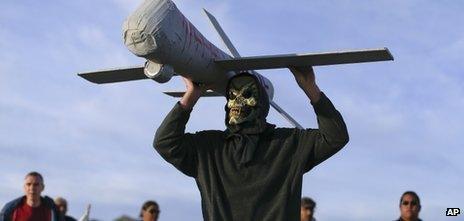Just war: From Augustine to Obama
- Published

Some protesters would argue there is little justice in drone strikes
During Barack Obama's recent counter-terrorism speech he invoked the centuries-old concept of "just war". The idea has a troubled history, and its use may not help clarify America's position.
The idea of the just war may be as old as war itself. Put simply, it is the idea that one side in a conflict has right on its side. However, when a belligerent state believes it has right on its side, it can sweep away all concerns about the treatment of those they fight against.
The Romans conceived of it some 2,000 years ago as the basis of a ceremony they would hold before going to war where priests would certify to the Senate that the cause for war was just.
Once this was decided, there were few rules restraining the conduct of battle. With justice on their side, the Romans felt free to plunder, pillage and murder.
The idea later became bound up with Christianity. From St Augustine to Thomas Aquinas, religious figures developed a theory of war as a tool of politics to be used to preserve peace, justice and order.
Although the religious tradition paid lip-service to the idea that enemies and non-combatants should be treated with mercy, it was not the main focus. The just war theory was largely concerned with the reasons for going to war, not how the war was conducted.
In fact, St Augustine thought any limitation on the conduct of the war was an "inevitable consequence of lack of absolute certainty such as God alone can give".
Rise of the UN
However, this idea works only if it is possible to know which side is "just". Such certainties began to break down when post-Renaissance theorists explored questions such as: "What happens if both sides believe they have God on their side?"
The 17th Century theoretician Hugo Grotius stated the problem in secular terms as: "It may happen that neither of the Parties in War acts unjustly. For no man acts unjustly, but he who is conscious that what he does is unjust; and this is what many are ignorant of."
He framed a theory that incorporated elements of Roman law, Christianity and the code of chivalry, which allowed for humane treatment for at least some people in wars between European states.
However, with the rise of the nation state and the supremacy of power of the sovereign, just war theory fell out of favour.
St Augustine framed the just war doctrine
To the leaders of European states and empires in the 18th and 19th Centuries, the idea that they would need any ethical justification for war would have seemed bizarre.
They went to war to seize land and expand trade, or to civilise and Christianise. The territories they conquered were, in their view, unclaimed. Their sovereignty was all the justification they needed.
This remained, by and large, the situation until the mid-20th Century when the United Nations Charter limited the right of states to go to war.
"All Members shall refrain in their international relations from the threat or use of force against the territorial integrity or political independence of any state," the charter said.
The only permissible way around this was in cases of self defence from an armed attack.
The idea of a just war has thus been shackled to the UN charter's concept of self defence.
The language of war has for decades been conducted in technical UN-speak; everyone wanting to confer legitimacy on a recourse to force speaks in terms of self-defence.
And conduct in war is a matter for international law under the Geneva Conventions and many other treaties. These laws are deliberately designed to be applicable to everyone, with no account of whether their cause is just or not.
So Mr Obama and his predecessor George W Bush have grappled with this huge weight of history.
They have both used the UN-infused language of self-defence but at the same time invoked concepts of moral righteousness.
Whatever the reasons for going to war, or continuing to conduct that war, they do not necessarily justify drone strikes, extraordinary renditions, or any other method of warfare.
As Michael Walzer states in his 1970s book Just and Unjust Wars: "It is perfectly possible for a just war to be fought unjustly and for an unjust war to be fought in strict accordance with the rules."
- Published24 May 2013
- Published24 May 2013
- Published24 May 2013